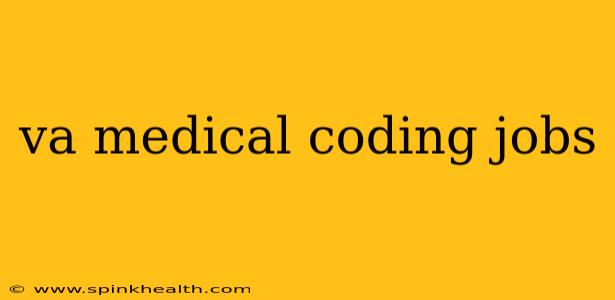The Veterans Affairs (VA) healthcare system is a sprawling network, providing crucial medical services to millions of veterans. Behind the scenes, ensuring the smooth operation of this vast system are dedicated medical coders, translating medical procedures and diagnoses into standardized codes used for billing, data analysis, and healthcare research. If you’re intrigued by the intersection of healthcare and meticulous detail, a VA medical coding job might be the perfect fit. This isn't just about numbers; it's about contributing to the well-being of those who have served our nation.
Let's unravel the intricacies of these roles, exploring the day-to-day realities, required skills, and career trajectory.
What Does a VA Medical Coder Do?
Imagine yourself as a vital link in the chain of veteran care. As a VA medical coder, your primary responsibility is to translate the complex medical language of doctors' notes, lab results, and procedure reports into standardized medical codes. These codes, primarily using the ICD-10 (International Classification of Diseases, 10th Revision) and CPT (Current Procedural Terminology) systems, are the language of healthcare billing and data management. Accuracy is paramount; a single incorrect code can impact reimbursements and potentially delay crucial medical services.
Your day might involve:
- Reviewing medical records: Carefully examining patient charts, identifying procedures performed, diagnoses made, and other relevant information.
- Assigning codes: Selecting the appropriate ICD-10 codes for diagnoses and CPT codes for procedures, ensuring accuracy and compliance with VA regulations.
- Auditing codes: Reviewing codes for accuracy and consistency, identifying and correcting errors.
- Maintaining records: Keeping meticulous records of coded information, adhering to strict data privacy and security protocols.
- Working with other healthcare professionals: Collaborating with physicians, nurses, and other healthcare professionals to clarify information or resolve coding discrepancies.
What Skills Do I Need for a VA Medical Coding Job?
While formal education is crucial, several key skills contribute to success in this field:
- Medical terminology: A solid understanding of medical terminology is essential for accurate code assignment.
- ICD-10 and CPT coding: Proficiency in using the ICD-10 and CPT coding systems is non-negotiable.
- Attention to detail: Accuracy is paramount; even minor errors can have significant consequences.
- Analytical skills: The ability to analyze medical records and identify the relevant information for coding is crucial.
- Organizational skills: Managing multiple patient records and maintaining accurate documentation requires strong organizational skills.
- Computer skills: Proficiency with various software programs used for coding and record-keeping is necessary.
What Education and Certification Do I Need?
Most VA medical coding positions require at least a high school diploma or equivalent, coupled with a medical coding certification. Common certifications include:
- Certified Professional Coder (CPC): Offered by the American Academy of Professional Coders (AAPC).
- Certified Coding Specialist (CCS): Offered by the American Health Information Management Association (AHIMA).
While not always mandatory, a formal associate's or bachelor's degree in health information technology or a related field can significantly enhance your job prospects and career progression.
How Much Can I Earn as a VA Medical Coder?
Salary expectations vary depending on experience, location, and certifications. However, you can expect a competitive salary that reflects the importance of this critical role within the VA healthcare system. Experienced coders with advanced certifications often command higher salaries.
Are There Different Types of VA Medical Coding Jobs?
The VA system is vast, offering various opportunities within medical coding:
- Inpatient coding: Focusing on hospitalizations and procedures performed within VA medical centers.
- Outpatient coding: Concentrating on services provided in VA clinics and outpatient settings.
- Specialty coding: Specializing in specific medical areas, such as cardiology, oncology, or surgery.
- Coding audit: Reviewing coded charts to ensure accuracy and compliance.
How Can I Find VA Medical Coding Jobs?
The best way to discover VA medical coding job opportunities is by visiting the official USAJOBS website (www.usajobs.gov). Regularly check for openings and tailor your application to highlight the specific skills and experiences relevant to each position. Networking within the healthcare community can also be beneficial.
What is the Career Progression Like?
With experience and further certifications, you can progress to supervisory roles, such as coding team lead or coding supervisor. You could also specialize in a particular medical field, becoming a sought-after expert in that area. The possibilities for growth and specialization are extensive.
This journey into the world of VA medical coding jobs illustrates the significance of meticulous work in supporting the vital mission of caring for our nation's veterans. It's a field that combines analytical skills with a deep sense of purpose, offering both professional fulfillment and a rewarding career path.

